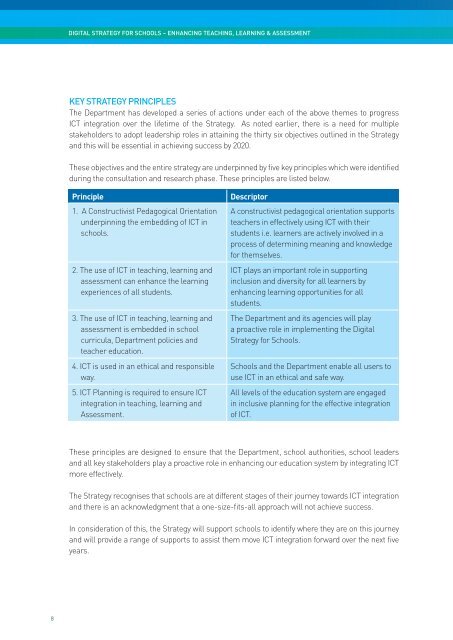Digital Strategy for Schools
TKmc0
TKmc0
You also want an ePaper? Increase the reach of your titles
YUMPU automatically turns print PDFs into web optimized ePapers that Google loves.
DIGITAL STRATEGY FOR SCHOOLS – ENHANCING TEACHING, LEARNING & ASSESSMENT<br />
KEY STRATEGY PRINCIPLES<br />
The Department has developed a series of actions under each of the above themes to progress<br />
ICT integration over the lifetime of the <strong>Strategy</strong>. As noted earlier, there is a need <strong>for</strong> multiple<br />
stakeholders to adopt leadership roles in attaining the thirty six objectives outlined in the <strong>Strategy</strong><br />
and this will be essential in achieving success by 2020.<br />
These objectives and the entire strategy are underpinned by five key principles which were identified<br />
during the consultation and research phase. These principles are listed below.<br />
Principle<br />
1. A Constructivist Pedagogical Orientation<br />
underpinning the embedding of ICT in<br />
schools.<br />
2. The use of ICT in teaching, learning and<br />
assessment can enhance the learning<br />
experiences of all students.<br />
3. The use of ICT in teaching, learning and<br />
assessment is embedded in school<br />
curricula, Department policies and<br />
teacher education.<br />
4. ICT is used in an ethical and responsible<br />
way.<br />
5. ICT Planning is required to ensure ICT<br />
integration in teaching, learning and<br />
Assessment.<br />
Descriptor<br />
A constructivist pedagogical orientation supports<br />
teachers in effectively using ICT with their<br />
students i.e. learners are actively involved in a<br />
process of determining meaning and knowledge<br />
<strong>for</strong> themselves.<br />
ICT plays an important role in supporting<br />
inclusion and diversity <strong>for</strong> all learners by<br />
enhancing learning opportunities <strong>for</strong> all<br />
students.<br />
The Department and its agencies will play<br />
a proactive role in implementing the <strong>Digital</strong><br />
<strong>Strategy</strong> <strong>for</strong> <strong>Schools</strong>.<br />
<strong>Schools</strong> and the Department enable all users to<br />
use ICT in an ethical and safe way.<br />
All levels of the education system are engaged<br />
in inclusive planning <strong>for</strong> the effective integration<br />
of ICT.<br />
These principles are designed to ensure that the Department, school authorities, school leaders<br />
and all key stakeholders play a proactive role in enhancing our education system by integrating ICT<br />
more effectively.<br />
The <strong>Strategy</strong> recognises that schools are at different stages of their journey towards ICT integration<br />
and there is an acknowledgment that a one-size-fits-all approach will not achieve success.<br />
In consideration of this, the <strong>Strategy</strong> will support schools to identify where they are on this journey<br />
and will provide a range of supports to assist them move ICT integration <strong>for</strong>ward over the next five<br />
years.<br />
8




